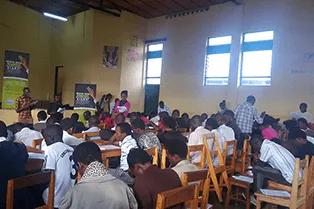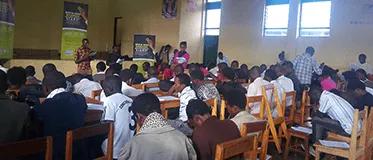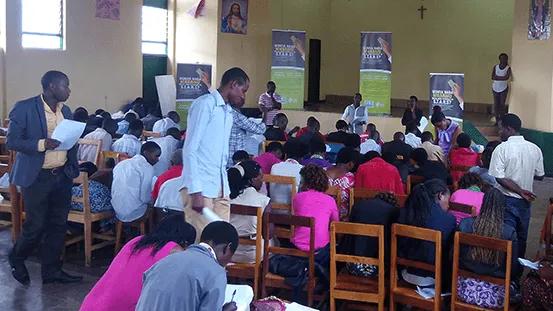Benin
Health
Training dogs to detect breast cancer, a method for screening disadvantaged women in Benin
Impact
News and Insights
The project “Supporting Teacher Achievement in Rwandan Schools” (STARS), led by Georgetown University in collaboration with the Ministry of Education of Rwanda and Innovation for Poverty Action, proposes to scale in public primary schools pay-for-performance contracts to raise teachers’ motivation and effort and improve student outcomes. FID supports the scale-up of this innovation to 10 of 30 Rwandan school districts.
Project ported by:


In Rwanda, reading levels among 2.5 million primary-school enrollees are slightly below average of Sub-Saharan African (Angrist et al., 2021) and 46% of fourth-grade students do not meet third grade expectations in numeracy (Republic of Rwanda, 2012). Gaps in learning are particularly large in low-income school districts with difference in learning levels having an impact far beyond the classroom and accounting for between 20-50% of income differences across countries (Angrist et al., 2021).
Teachers are key to student raising learning outcomes and central to addressing this learning crisis. However, in Rwanda 20% of primary schools teachers resign every year and low salaries exacerbate skill shortages (World Bank and Government of Rwanda, 2019). Thus, government capacity to recruit, motivate, and retain effective teachers is crucial to the goal of raising student learning outcomes.
A growing body of evidence suggests that when offered at the individual-teacher level and designed to incentivize student learning, teacher performance contracts are an evidence-based innovation that have enhanced student learning outcomes in contexts from India (Muralidharan and Sundararaman 2011; Muralidharan 2012) to Israel (Lavy, 2009) to Tanzania (Mbiti et al., 2019) to Uganda (Gilligan et al., forthcoming).
In Rwanda, the scale-up of this approach relies on rigorous evidence drawn from a randomized controlled trial conducted in partnership with the Rwanda Education Board (Leaver et al., 2021). In this model, the pay-for-performance contracts were based on a combination of three measures of teachers’ classroom inputs: their attendance, their preparation and their pedagogy. The results showed that teacher performance contracts delivered annual learning gains equivalent to an additional year of status-quo learning (Crawfurd, 2021), accompanied by improvements in teacher presence and classroom pedagogy.
The STARS scale-up leverages Rwanda’s existing teacher management system, which already includes a performance-based teacher payments model –the “imihigo” – which did not reward teacher’s efforts optimally, and student learning assessment system.
To assess its heterogeneous impacts at scale, a base model and five contract variations were successfully tested:

The project was implemented in ten districts across Rwanda, reaching 345 schools and 6,664 teachers. It benefited approximately 344,000 primary school students between 2022 and 2024.
The project results confirmed that the program had been successfully implemented: Teachers in the treatment group changed their working habits, with significant increases in lesson plan availability and pedagogy scores. For instance, the rate availability of lesson plan increased by 11 to 19 percentage points compared to the control group in the second year. The rate of teachers reporting students’ assessment results in the CA-MIS also increased, highlighting the impact of the Imihigo contracts.
In terms of student learning outcomes, three of the five treatment arms outperformed the base model, showing notable improvements in student performance. Specifically, the models that (i) added subjective assessments of teachers’ progress by head teachers, (ii) included learning assessment audits and (iii) offered incentives to head teachers based on the performance of the teachers in their schools, demonstrated positive and significant impacts on student learning outcomes.
For more information on the learning outcomes and policy implications of the STARS project, see the full article on the STARS project (available here).
Projects
Projects funded by FID